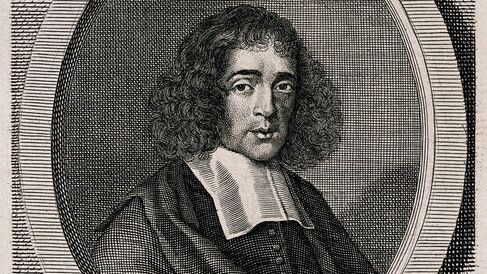to
Lightfoot Room, Faculty of Divinity, Cambridge

About
NB: This seminar is scheduled for an alternative day & time: 12:30pm, Monday.
In 2017, composer Dániel Péter Biró began developing a series based on philosophical texts by Baruch Spinoza (1632–1677), supported by a Guggenheim Fellowship. The Ethica Composition Cycle (ongoing) explores Spinoza’s philosophy of the mind alongside the historical dilemma of a 17th-century Jewish immigrant in the Netherlands and from the perspective of a modern globalized existence.
The cycle integrates phonetic aspects of Spinoza’s text with melodic material derived from Portuguese plainchant from the time of the Jewish expulsion and Torah trope from the Portuguese synagogue in Amsterdam. Integrating elements of these traditions from past and present Dutch immigrant communities, Biró's cycle explores the continuing relevancy and complexity of Spinoza’s Enlightenment project and its relationship to statehood and belonging.
Spinoza dealt with problems of persecution, immigration, assimilation and tradition in a society dominated by Calvinist thought. These same issues become creatively engaged in the Ethics composition cycle, as the work integrates, via musical material and form, Jewish concepts of nature and the divine with Spinoza’s philosophy of the mind. In this lunchtime seminar, Biró will discuss how the composition deals with these issues and how they relate to historical and contemporary questions of immigration and belonging, mind and spirit. In addition, he will discuss how his studies of Jewish and Islamic chant traditions, as practiced in the Netherlands, have influenced the composition cycle.
The composition cycle attempts to understand, translate and give commentary to specific aspects of Spinoza’s philosophical thought. To appreciate this, one must understand Spinoza’s biography and historical context, and the theological framework for such a philosophy of mind.
Spinoza’s thinking regarding the mind and consciousness can also be re-evaluated in terms of the new developments in philosophy and science: Spinoza’s concept that intuition, rationality and a larger concept of mind – connecting to nature and the divine – can also be perceived in recent attempts to define intellect and its relationship to the physical world. Such correlations connect to recent theories of emergence in physics, as examined by philosopher Grit Schwarzkopf. Integrating historical and contemporary theories of spirit and mind, the composition cycle not only responds to these theories but also transports historical realities of sound into new contemporary artistic frameworks.
About the speaker
Dániel Péter Biró studied in Hungary, Germany, Switzerland, Austria and Israel before receiving his PhD from Princeton University in 2004. From 2004–2009 he was Assistant Professor and from 2009–2018 Associate Professor for Composition and Music Theory at the University of Victoria.
In 2011 he was Visiting Professor, Utrecht University and in 2014–2015 Research Fellow, Radcliffe Institute for Advanced Study, Harvard University. In 2017 he was awarded a Guggenheim Fellowship.
Biró is now Professor for Composition at the Grieg Academy in Bergen, Norway and directs the project Sounding Philosophy as part of the Norwegian Artistic Research Program (2021–2025).
Further resources
The project Sounding Philosophy integrates music composition, philosophy and science to understand how theories of reason and the mind can be approached from creative, metaphysical and scientific perspectives. View a log of Sounding Philosophy activities (including video and other media, via researchcatalogue.net).
In the sound-essay “Komponieren als Erweiterung des Bewusstseins: Der Ethica-Kompositionszyklus” (Composing as an expansion of consciousness: The Ethica composition cycle), Biró explains the genesis of his Spinoza cycle and introduces nine extracts from his work. Listen and/or read Biro’s sound-essay courtesy of the German broadcaster SWR (swr.de).
Biró’s Scholium Secundum (2017–2022) was performed by the Schola Heidelberg and ensemble aisthesis at St John’s Church, Bergen, Norway in February 2022. A recording of this 2022 performance is available to watch below (via YouTube).
For further information, visit Biró's website (danielpeterbiro.no).
Also happening
While in Cambridge, Dániel Péter Biró will be joining Dr Vanessa Paloma Elbaz’s weekly workshop on Hebrew Psalm cantillation at the Peterhouse Brewhouse, and leading a Composer’s Workshop at the Faculty of Music on Tuesday 30 January at 2pm. The Tuesday session will explore aspects of parametrical translation and transformation within the Ethica cycle. Anyone interested in joining the Psalm cantillation workshop should contact Dr Vanessa Paloma Elbaz by email.
Image: The featured image shows an etching of Baruch Spinoza from a French edition. It is a detail from a copy owned by the Wellcome Collection, licensed for reuse under Creative Commons 4.0 (attribution required).Contact
Dr Giles Waller
